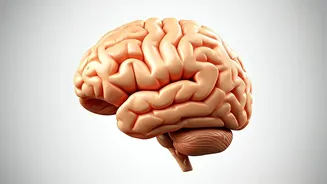Brain's Remarkable Plasticity
The human brain is an amazing organ, possessing an incredible capacity for change and adaptation, a quality known as neuroplasticity. This means your brain isn't
fixed; it can grow and reshape itself throughout life. It is not limited by age or circumstances. While the concept may seem complex, the application is surprisingly simple. This inherent ability allows us to learn new skills, recover from injuries, and even physically alter the brain's structure. The key is to engage in activities that stimulate the brain and encourage the growth of new neural connections. Engaging in challenging cognitive tasks, acquiring new knowledge, and adopting new habits are all key to harnessing neuroplasticity. The positive effects are enhanced cognitive function, improved memory, and a more resilient brain overall. This continuous process of learning and adaptation contributes significantly to both mental agility and overall well-being throughout life.
The Simple Exercise
The simple exercise in question is, quite unexpectedly, regular physical activity. Rather than requiring expensive equipment or specialized training, the neurologist recommends a consistent exercise routine. This recommendation is based on scientific research demonstrating that exercise can promote brain health in several ways. The most important of these is enhancing blood flow to the brain, delivering more oxygen and nutrients to neurons. Furthermore, exercise stimulates the release of growth factors, which are chemicals that support the growth of new brain cells and protect existing ones. Regular exercise also reduces inflammation, a factor that can damage the brain. Incorporating moderate-intensity aerobic exercise, such as brisk walking, jogging, or cycling, for at least 30 minutes most days of the week, can have a profound impact on brain health. This simple yet effective approach provides a powerful and accessible method to boost brain function and enhance overall health.
Exercise's Cognitive Benefits
The advantages of exercise are not limited to physical health, but extend to cognitive function as well. Engaging in regular physical activity has been shown to improve memory, focus, and overall cognitive performance. The enhanced blood flow to the brain, a result of exercise, directly benefits cognitive processes, improving the efficiency of neuronal communication. Furthermore, exercise has been linked to a reduction in the risk of cognitive decline and neurodegenerative diseases such as Alzheimer's. Research suggests that exercise may increase the size of the hippocampus, the brain region crucial for memory and learning. By protecting and enhancing cognitive function, exercise contributes significantly to a better quality of life. The mental clarity and sharpness gained from consistent exercise can impact daily activities, productivity, and overall well-being. Regular exercise becomes a valuable tool for preserving and enhancing cognitive abilities throughout life.
Making It a Habit
Incorporating exercise into your daily routine is essential to reap its cognitive benefits. A successful approach starts with setting realistic goals and making it an enjoyable activity. Begin with a manageable workout schedule, perhaps 20-30 minutes of walking or cycling several times a week, gradually increasing the duration and intensity as your fitness level improves. To maintain consistency, find an activity you genuinely enjoy, whether it’s dancing, swimming, or joining a sports team. This increases the likelihood of adherence and transforms exercise from a chore into a source of pleasure. Plan your workouts in advance, treating them like important appointments. Scheduling exercise time can help prioritize it. If motivation wanes, consider enlisting a workout buddy for mutual support and accountability. Tracking progress and celebrating milestones can maintain your motivation. Making exercise a regular habit requires planning, consistency, and a positive mindset.
Complementing Your Routine
While exercise is crucial, complementing it with other brain-boosting activities can maximize the positive effects. A healthy diet, rich in fruits, vegetables, and omega-3 fatty acids, provides the essential nutrients for optimal brain function. Getting sufficient sleep is also vital, as the brain uses this time to consolidate memories and repair itself. Engaging in mentally stimulating activities like reading, puzzles, or learning a new skill helps to keep the brain active and engaged. Practicing mindfulness and reducing stress also support cognitive health. The combined effects of exercise, good nutrition, adequate sleep, and mental stimulation create a supportive environment for the brain. Making these practices part of your lifestyle can enhance overall well-being and provide comprehensive brain health support. This holistic approach supports a more resilient and functional brain.
























